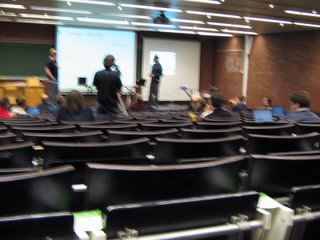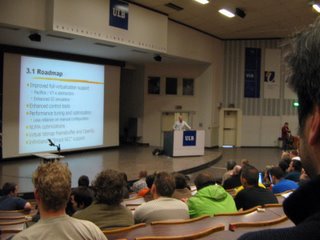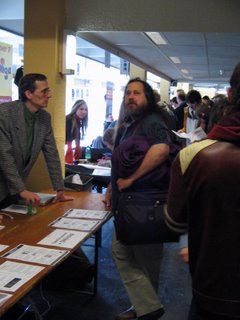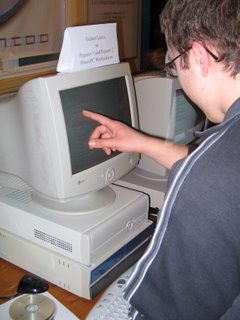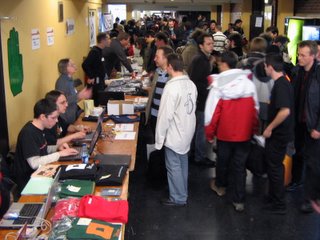first up was Greg Stein, working for Google on the excellent subversion. Which is a better CVS, because they based it upon it. The reason for this is simple, the program is so immensely popular. The main advantages of svn are; a better use of resources, good binary handling, use of revision numbers instead of dates and maintenance of branches. In the future Greg would like to add merge support and a database back-end.
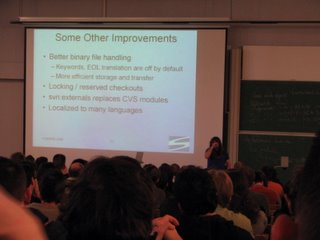
Next up was Julian Seward with his little talk on valgrind, an excellent memory usage profiler. It will analyze any program, even closed source ones, on their memory (mis)use. Valgrind is the name of a suite containing many tools like memcheck and cachegrind. You can use it to detect many memory mishaps like; memory leaks, cache hit fails and bad references. Julian suggest running valgrind on any program you write by default. It will detect a lot of bugs you never though of and will make your program more stable after fixing those bugs. Some people I was sitting next to questioned the difference between valgrind and dtrace. The first is a reporting tool on program memory usage while the second provides you with an interactive system querying tool. Both powerful tools in their own right.
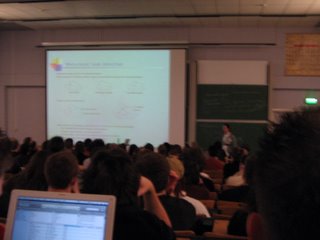
The afternoon started of with Jon Trowbridge (which is now working for, surprise, Google) on Beagle. Jon is no longer working on this project so he considered this his farewell speech. Beagle started as a back-end for the dashboard project. dashboard was very hard to make work correctly because it was missing this back-end infrastructure, beagle was supposed to be just that. At the moment there is no active development on dashboard. Beagle contains an easy to devel for plugin interface, so everybody can extend it to include any program/data. The most difficult part is getting data out of programs. Each program is pretty good at managing its own data, but does not report anything about it. Evolution is a prime example, it is very hard to get evolution to report the data it maintains, but it is also hard to tell it to show certain data if you know what you want. Things you have to keep in mind when writing search aware applications. Jon did confess that beagle was not developed with multi user machines in mind.
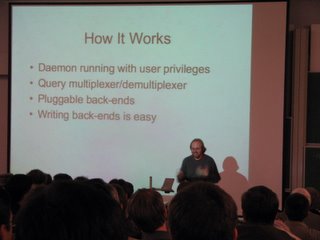
Micheal Meeks is a very energetic speaker, last time I saw him at fosdem he was still working for Ximian, now he's a Novell employee. He's hacking away at OO.o, an important project because it is so visible and everybody uses it. It is an important revenue source for MS, and accounts for 75% of the software costs of a new PC. The spreadsheet appears to be the most important part of the suite and yet this has a small team of developers (while MS has many). Some improvements where made in speed, using valgrind, and VBA macros support is available (only 20% of the language is covered, but it turns out to be enough to get most things working).

The final fosdem talk was given by Jeff Waugh, he talked about the Linux desktop and the challenges it holds. He started of showing the differences between Gnome 1.x and the current version. This really showed how insane some of the earlier options were, much up to the point of being plain silly. Now Gnome tries to do the right thing most of the time, while still allowing you to change the options you could care about. The same is true for dialog boxes, these can be interpreted now most of the time by just reading the button text instead of the while dialog text. The talk slowly transformed in why and how to get people over to a free/open desktop. We have to offer a package, which is compelling enough to switch. One single application never makes people switch, rather a framework does. Examples of this are; LAMP and iPod>iTunes>ITMS. The 'gratis' part is important as well. Ubuntu tries to do these by never charging for their distro and providing a framework like launchpad.
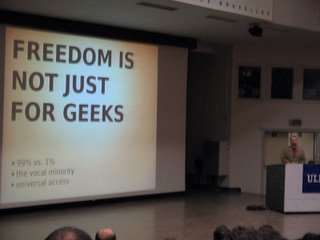
Some random pictures of the event to end my report. As a bonus you can try to find the hidden Chipzz!





